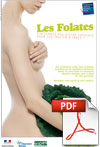Getting pregnant
Pregnancy beginning
Pregnancy monitoring
Childbirth
Special cases
Post-partum immédiat
Post natal consultation
Nutrition and supplements

Eating well during pregnancy
Common weight gain during pregnancy is around 12 kg (26,5 pounds), but can change depending of the initial weight. It is truly important to have a proper and varied nutrition, including in particular:
- Proteins: meat, chicken, fish, eggs.
- Vitamins: fruits & vegetables
- Calcium: milk products
- Iodine: iodized salt, fish
- Adequate hydration every day: at least 1,5 l. of water every day.
Nutrients supply will be spread over 3 main meals; 1 or 2 additional collations can be added. High consumption of exciting drinks (coffee, tea) needs to be avoided.
If you are not immunized against toxoplasmosis
- Wash your hands and everything you use to prepare raw meat, fish, chicken, fruits, vegetables, and aromatic herbs.
- Make sure your meat has been fully cooked.
- Wash fruits and vegetables before eating them.
- Eat predominantly frozen food (except fruit and vegetables)
- Always keep clean kitchen counter, and all utensils used to cook.
- Use gloves for gardening and changing cat’s litter box.
To prevent listeriosis
Listeriosis is caused by a bacterium found in soil and water, so it can be found on vegetables, meats and diary products as well as in processed foods such as cheeses. Listeriosis infection during pregnancy can result in several severe maternal-fetal infections.
- Avoid eating food like cheeses typically made with unpasteurized milk, hard and semi-soft-cheeses, smoked fish, raw shells, delicatessen.
- Make sure all meat-based food is fully cooked.
- Wash all fruits, vegetables and aromatic herbs.
- Stock separately raw and cooked food.
- Clean up your fridge regularly.
Vitamins & oligo elements supplements:
Vitamin and iron supplements are not mandatory.
Folic acid supplement is recommended 1 month before getting pregnant and until 2 months of pregnancy.
A unique D vitamin supplement is recommended, starting the 7th month of pregnancy.
Last update: 10/2/2013


